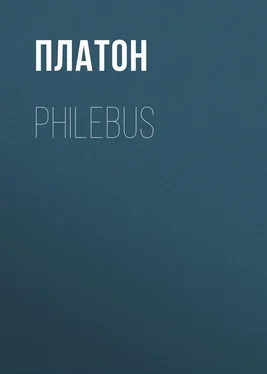And now, from the consideration of pleasure, we pass to that of knowledge. Let us reflect that there are two kinds of knowledge – the one creative or productive, and the other educational and philosophical. Of the creative arts, there is one part purer or more akin to knowledge than the other. There is an element of guess-work and an element of number and measure in them. In music, for example, especially in flute-playing, the conjectural element prevails; while in carpentering there is more application of rule and measure. Of the creative arts, then, we may make two classes – the less exact and the more exact. And the exacter part of all of them is really arithmetic and mensuration. But arithmetic and mensuration again may be subdivided with reference either to their use in the concrete, or to their nature in the abstract – as they are regarded popularly in building and binding, or theoretically by philosophers. And, borrowing the analogy of pleasure, we may say that the philosophical use of them is purer than the other. Thus we have two arts of arithmetic, and two of mensuration. And truest of all in the estimation of every rational man is dialectic, or the science of being, which will forget and disown us, if we forget and disown her.
'But, Socrates, I have heard Gorgias say that rhetoric is the greatest and usefullest of arts; and I should not like to quarrel either with him or you.' Neither is there any inconsistency, Protarchus, with his statement in what I am now saying; for I am not maintaining that dialectic is the greatest or usefullest, but only that she is the truest of arts; my remark is not quantitative but qualitative, and refers not to the advantage or repetition of either, but to the degree of truth which they attain – here Gorgias will not care to compete; this is what we affirm to be possessed in the highest degree by dialectic. And do not let us appeal to Gorgias or Philebus or Socrates, but ask, on behalf of the argument, what are the highest truths which the soul has the power of attaining. And is not this the science which has a firmer grasp of them than any other? For the arts generally are only occupied with matters of opinion, and with the production and action and passion of this sensible world. But the highest truth is that which is eternal and unchangeable. And reason and wisdom are concerned with the eternal; and these are the very claimants, if not for the first, at least for the second place, whom I propose as rivals to pleasure.
Конец ознакомительного фрагмента.
Текст предоставлен ООО «ЛитРес».
Прочитайте эту книгу целиком, купив полную легальную версию на ЛитРес.
Безопасно оплатить книгу можно банковской картой Visa, MasterCard, Maestro, со счета мобильного телефона, с платежного терминала, в салоне МТС или Связной, через PayPal, WebMoney, Яндекс.Деньги, QIWI Кошелек, бонусными картами или другим удобным Вам способом.









